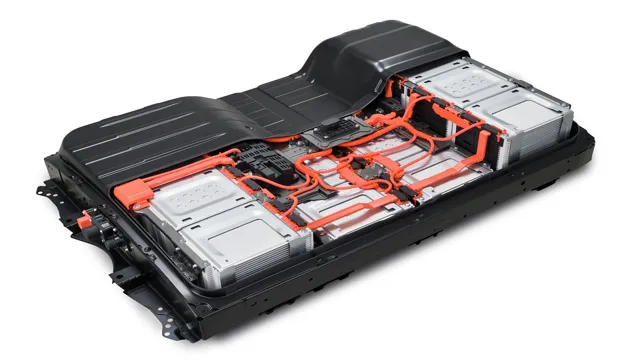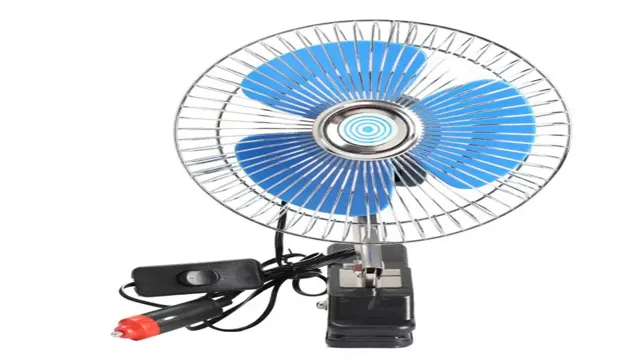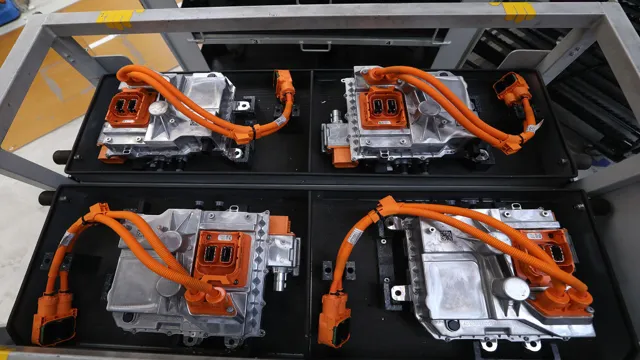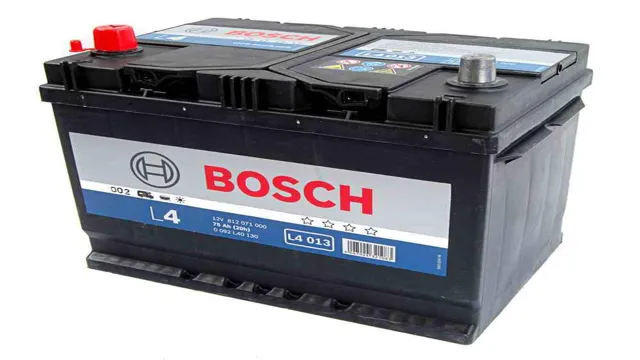Unleashing the Truth: How Does Cold Weather Affect the Performance of Electric Car Batteries?
Electric cars are becoming increasingly popular worldwide as people embrace the shift towards eco-friendly solutions. With their lower carbon footprint and efficient performance, they offer many benefits over traditional fuel-driven cars. However, one potential issue that challenges EV owners is cold weather, which can significantly affect the car batteries.
As a result, many people are left wondering how electric car batteries perform in cold weather conditions. In this blog post, we’ll dive into the topic of electric car batteries and cold weather, and explore the impact that cold weather has on battery life, performance, and overall reliability.
How Low Temperatures Affect Batteries
One of the biggest concerns for electric car owners during the colder months is how low temperatures affect their batteries. It’s a well-known fact that batteries don’t perform as well in cold weather as they do in warmer temperatures. This is because cold temperatures can slow down the chemical reactions that take place inside the battery, making it harder for the electrons to flow and reducing the battery’s overall capacity.
Moreover, extreme cold can actually cause the battery to lose its charge altogether, leaving you with a completely dead battery that might not even be able to jump-start. To avoid these issues, it’s important to take care of your battery during the winter months. This could include parking in a garage or sheltered area, making sure your battery is fully charged before leaving, and investing in a battery warmer or insulator.
By taking these precautions, you can help ensure that your electric car is able to run smoothly and efficiently even when the temperatures drop. So if you want to make sure your car is ready for the winter, make sure to keep a close eye on your battery and take steps to keep it protected.
Reduced Capacity and Range
One of the biggest challenges electric vehicles face during cold weather conditions is reduced battery capacity and range. In general, EV batteries prefer milder climates, and as temperatures drop, their performance declines too. The reason behind this reduced capacity and range is that low temperatures slow down the chemical reactions inside the battery that generate electric energy.
As a result, the battery’s output power decreases, making it harder for the electric vehicle to achieve the same performance it does in warmer conditions. To put it simply, it’s like trying to run a race while being weighed down; the battery has to work harder to maintain the same speed, ultimately resulting in a shorter run for the vehicle. This phenomenon is precisely why owners of electric vehicles should be mindful of the forecast and know that their battery’s range may be shorter than usual during cold weather.

Increased Charging Time
When temperatures drop outside, we often feel the need to bundle up and turn up the heat. The same goes for our electronic devices, such as our smartphones and laptops. Cold temperatures can have a significant impact on the batteries of these devices, leading to increased charging times and decreased battery life.
This is because the chemical reactions within the battery are slowed down in colder temperatures, making it harder for the battery to hold a charge. It’s like our own bodies in the cold – we move slower and feel more sluggish. The best way to combat this problem is to keep your devices at a moderate temperature and avoid exposing them to extreme cold.
Additionally, using a high-quality charger can help to minimize the effects of low temperatures on your battery and keep it charging efficiently. Don’t let the cold affect your device’s battery life – take care of it with a little extra TLC.
Possible Battery Damage
When temperatures drop, it’s important to remember that your battery is affected too. Cold weather can cause your battery to lose some of its charge, making it more difficult to start your vehicle or run your electronic devices. But did you know that extremely low temperatures can also cause permanent damage to your battery? The chemistry inside your battery relies on chemical reactions to create a charge, and these reactions slow down when it gets cold outside.
If the temperature drops below freezing, your battery can actually freeze solid, which can cause the casing to crack or even damage the internal components. To prevent this from happening, it’s important to keep your battery warm and fully charged during the winter months. This will help ensure that your battery is always ready when you need it and prevent costly damage that could require a replacement.
So, make sure to take care of your battery this winter and keep it warm and fully charged to avoid any possible damage caused by low temperatures.
Tips for Maintaining Your Battery in Cold Weather
Electric car batteries are susceptible to draining faster in cold weather. To maintain your battery’s performance, there are a few things you can do. First, keep your car parked in a garage or covered area where temperatures are not as extreme.
If this is not feasible, invest in a battery blanket to keep your battery warm. Additionally, limit the use of accessories such as heaters, defrosters, and seat-warmers when possible as they can drain your battery quicker. Plan your trips accordingly and avoid driving in extreme weather conditions as much as possible.
Finally, keep your battery charged regularly, ensuring it is at or above 50% when parked for long periods. By taking precautions and being mindful of your battery usage, you can help maintain its performance and extend its lifespan, even in cold weather.
Preheat the Battery
“battery maintenance in cold weather” As the temperature drops, your car battery can start to struggle. Fortunately, there are several steps you can take to maintain your battery in cold weather. One easy method is to preheat the battery.
This involves turning on your car and letting it idle for a few minutes before driving off. By doing this, the engine generates heat, which in turn warms up the battery. This makes it easier for the battery to deliver power to the engine, which is essential for starting your car on a cold morning.
Another option is to use a battery warmer, which can be installed on your car’s battery and plugged into a power outlet overnight. This will keep the battery at a consistent temperature, reducing the risk of it freezing and extending the battery’s lifespan. By following these simple steps, you can ensure that your battery stays healthy and reliable all winter long.
Keep the Battery Charged
Maintaining Your Battery in Cold Weather When the temperature drops, so does the performance of your vehicle’s battery. In colder climates, a weak battery can quickly lead to an immobilized engine. To prevent this, there are a few simple steps you can take to maintain your battery in cold weather.
First, keep the battery charged by starting the engine at regular intervals. Ideally, you should start the car at least once a week, even if you don’t intend to drive it. It’s also important to limit the use of electrical accessories like heaters and lights when the engine is not running.
These can drain the battery quickly in cold weather. Additionally, make sure the battery terminals are clean and tight, and consider investing in a special battery heater or insulator to provide extra protection from the cold. By taking these precautions, you can ensure that your battery remains healthy and functional all winter long.
Use a Battery Blanket or Heater
One of the best ways to maintain your battery in cold weather is to use a battery blanket or heater. These tools work by keeping your battery warm, which can help to improve its performance and extend its lifespan. Battery blankets are designed to wrap around your battery and provide insulation so that it doesn’t lose heat, while battery heaters use an electric current to warm up your battery and keep it at a steady temperature.
With these tools, you can prevent your battery from freezing and ensure that it starts reliably, even in the coldest weather. Just be sure to follow the manufacturer’s instructions and use these tools safely to avoid any damage to your battery or vehicle.
Best Electric Cars for Cold Climates
Electric cars have gained popularity in recent years, but drivers who live in colder climates may have concerns about their battery performance during winter months. Electric car batteries are affected by cold weather, resulting in reduced range and slower charging times. However, some electric car models are better equipped to handle cold weather conditions than others.
The Tesla Model 3 and Model S have larger batteries and better insulation, allowing them to perform well in colder temperatures. The Chevrolet Bolt and Hyundai Kona Electric also have advanced battery technology, allowing them to maintain range in cold weather. Additionally, the Nissan Leaf has an available heat pump system that improves battery efficiency in cold weather.
It’s important for drivers to research and consider the battery capabilities of an electric car before purchasing, especially if they live in a colder climate. However, with advancements in technology and more electric car models being equipped to handle cold weather, it’s becoming easier for drivers to make the switch to electric vehicles.
Tesla Model S
As winter rolls in, electric car owners may be wondering which vehicles perform best in cold climates. When it comes to the Tesla Model S, it’s a mixed bag. On one hand, the Model S boasts plenty of features that make it ideal for cold weather driving.
For example, its battery pack is designed to maintain performance even in frigid temperatures. Plus, the Model S is equipped with a powerful heating system that keeps passengers warm and toasty. However, the Model S may struggle a bit in very cold weather, such as temperatures that dip below -10 degrees Fahrenheit.
At these extreme temperatures, the battery pack can struggle to maintain its full range. Nevertheless, the Model S remains one of the best electric cars out there, and it’s certainly worth considering if you’re looking for a reliable, high-performance vehicle to take on the winter roads.
Audi e-tron
When it comes to electric cars, their ability to withstand cold climates can be a concern for many potential buyers. Thankfully, there are several options on the market that are perfect for those living in areas with harsh winter conditions. One of the best options currently available is the Audi e-tron.
This all-electric SUV boasts a range of over 200 miles and has a heat pump system that uses waste heat from the electric drivetrain to help keep the cabin warm. Additionally, the e-tron has an available cold weather package that includes features such as heated rear seats and a heated steering wheel to ensure maximum comfort in freezing temperatures. This innovative and eco-friendly vehicle is an excellent choice for anyone looking for a reliable electric car that can handle even the toughest of winter climates.
Final Thoughts on Electric Car Batteries in Cold Weather
When it comes to electric car batteries, cold weather can certainly pose some challenges. While lithium-ion batteries are efficient at storing electrical energy, they can struggle when temperatures drop below freezing. In fact, extreme cold can significantly reduce the range of an electric vehicle and even cause the battery to fail altogether.
This is because low temperatures slow down the chemical reactions inside the battery, making it harder for the electrons to move. One way to combat this issue is to have a battery heating system, which can help warm up the battery before driving. Additionally, keeping the car parked in a warm garage or using a battery blanket can help prevent the battery from getting too cold.
Overall, while cold weather can affect electric car batteries, there are ways to mitigate the impact and ensure your vehicle remains efficient and reliable, even in wintry conditions.
Conclusion
Just like how a warm cup of cocoa thaws our frozen toes, electric car batteries also need warmth to function at their best in cold weather. So don’t let the winter chill dampen your sustainable driving dreams – equip your electric car with cozy heating systems and keep those batteries nice and toasty!”
FAQs
How does cold weather affect electric car batteries?
Cold weather can reduce the battery performance in an electric car. The chemical reactions within the battery slow down at lower temperatures, resulting in a shorter driving range.
Is it possible to improve the battery life of an electric car in cold climates?
Yes, there are several ways to improve battery performance during cold weather. These include preheating the battery before driving, using battery blankets, and avoiding rapid acceleration or sudden stops that can reduce the battery’s capacity.
Can using the heater in an electric car drain the battery quickly in cold weather?
Yes, using the heater in an electric car can significantly reduce the battery’s capacity during cold weather. It is recommended to use the seat heaters and steering wheel heater instead of the cabin heater, which can save the battery charge.
How long does it take to recharge an electric car battery in cold weather?
Recharging an electric car battery in cold weather can take longer than in warmer weather. This is because the battery’s capacity may be reduced, and the charging process is slowed down to prevent overheating the battery. It is recommended to use a level 2 charger to reduce the charging time.






